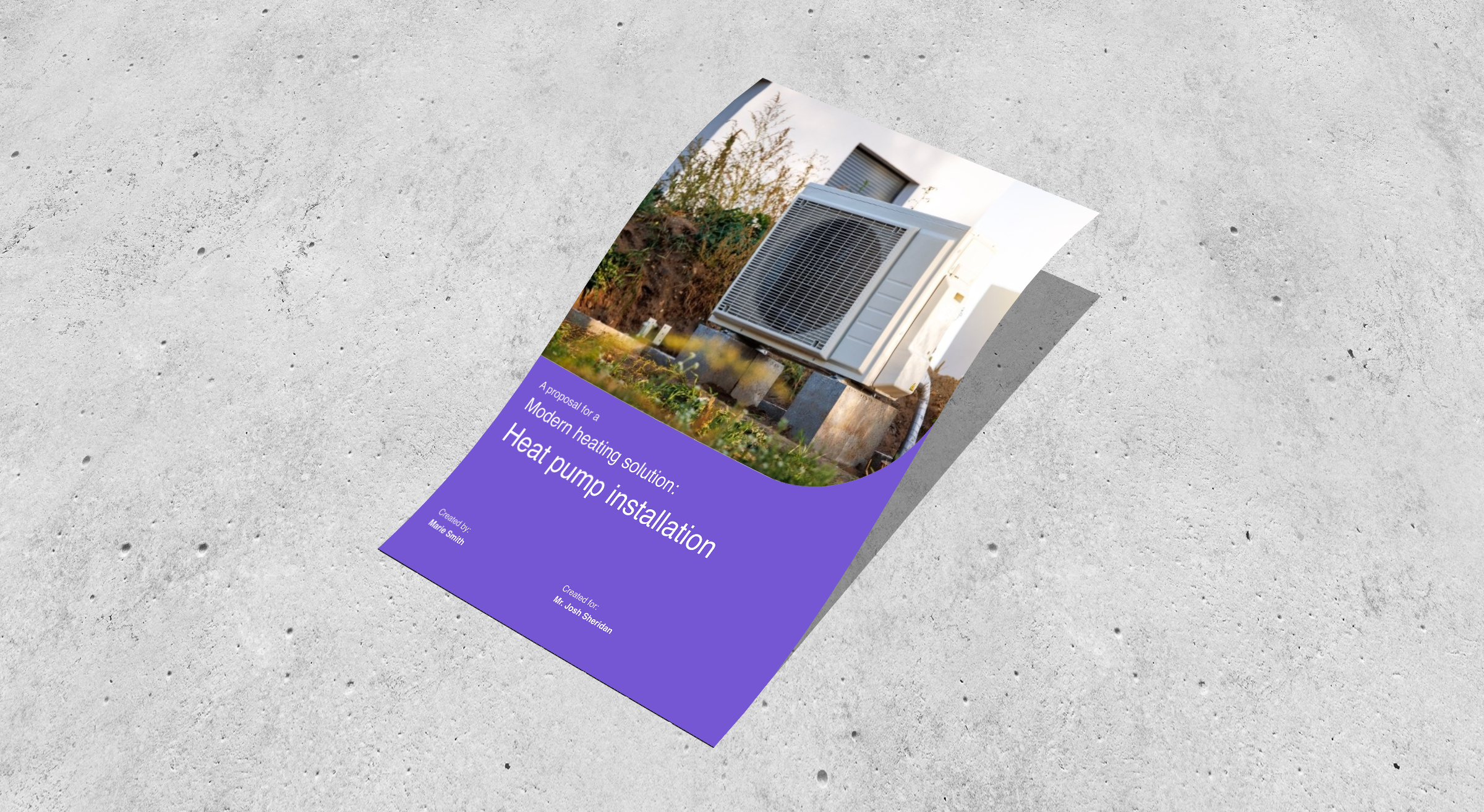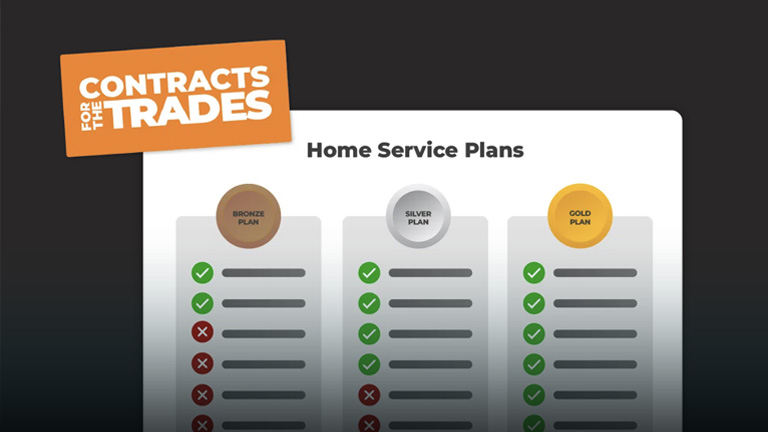How to Get and Manage Property Maintenance Contracts
February 21, 2024 | Read: 9 minutes

Winning a new contract is an exciting prospect. It can mean financial stability, peace of mind, and help your team to better organise their workload.
Of course, winning a contract is just the beginning. You need to know how to manage your property maintenance contracts efficiently, too.

In this blog, we’re explaining exactly how to manage your property maintenance contracts.
We’ll touch on how you can make the most of these contracts. We’ll also explore how you can demonstrate value to your customers.
Altogether, you’ll see exactly what how powerful even a simple contract can be.
Join us as we explore the basics or contracts. We’ll show discuss how to get property maintenance contracts and showcase tools to manage them well, too.

What is a Property Maintenance Contract?
A property maintenance contract is a documented agreement between your service business and your customer. A contract will detail how you’ll maintain, repair, or otherwise take care of their property and/or asset.
Depending on your industry, that could include boilers, air conditioning units, or fire alarm systems. In the contract itself, you’d find all the necessary details that outline what your business is responsible for. This will likely include cost, scope of work, deadlines, and legal requirements, too.
Why do you need a Property Maintenance Contract?
There are a few simple reasons you may want to start using maintenance contracts (sometimes called a maintenance agreement).
As Mark McSgane, Marketing Director of Boiler Cover UK, writes:
The keys to successfully managing service agreements in any trade or field service firm are efficiency, communication, and clarity.
With that said, we’ve summarised some points below:
- For setting clear expectations: both you and the customer can see exactly what’s been agreed. With a contract, there’s no question about the agreed terms of service.
- For efficiency: when this is clear, businesses can function more efficiently as it’s apparent that needs must be met and when. More advanced contracts might include planned preventive maintenance and include service level agreements.
- To build trust: it’s a sign of security for both sides. A contract shows that you’re dedicated to delivering your services and this gives customers peace of mind.
- For financial security: Have a property maintenance contract can help your business to secure recurring revenue. Whether it’s a monthly recurring payment or an annual fee, it ensures financial security vs. ad-hoc work.
There a numerous reasons why all these points can help, but the professionals certainly agree:
By prioritizing transparent communication, embracing technology, and maintaining contract adaptability, trade/field service businesses can elevate their service agreement management for sustained success.
Chris Townsend, Three Movers
How to Get a Property Maintenance Contract (and manage them!)
Here are some points that will help you to get a property maintenance contract.
From earning a customer’s trust, figuring out cost, to software management tools, let’s take a look:
1. Demonstrate accountability and build trust
With a contract, your business can set a powerful precedent. It can show customers that you’re dedicated to meet their needs and that you’re confident you can be accountable.
As we touched on above: this establishes trust.
It’s important to keep in mind that you shouldn’t offer a property maintenance contract that you can’t actually fulfil. This may sound obvious, but there can be a temptation by some businesses to blag their way into winning a job. But if your business does this and is incapable of fulfilling the contracted requirements, it won’t end well for anyone.
Besides: honesty is the best policy. You want to be able to demonstrate that your business can serve customers and be accountable.
Whether you’re approaching a customer about a residential contact, or drafting a whole commercial maintenance contract, data will prove that you know your business inside and out. With a contract, you can be transparent, set expectations, and it’s this that will inspire confidence from your customers
2. Manage property maintenance jobs with software
Field service managers sometimes underestimate the strain on their resources that a maintenance contract implies. This is why it’s essential to show that you’ve accounted for an increased workload depending on the type of services you provide.
This is where your planned maintenance software can shine.
No matter who you’re proposing to sign a property maintenance contract with, you need to show how you plan to accommodate meet their needs, when they need it. Whether it’s a 4 hour or 24 hour response window, such details need to be clear.
Job scheduling software can make it much easier for your team to manage any kind of job. You can use it to work around planned jobs, emergency appointments, and ad-hoc bookings that might come, too.
With maintenance contracts in place, you can use software to strategically plan ahead and carry out preventive maintenance work throughout the year. In this way, you give your team the best chance of catching issues with an asset before they become expensive problems. These could be difficult to deal with in an emergency, and customers won’t respond well to these scenarios.
Let’s say, hypothetically, that all your customers were on a maintenance contract for a boiler service. This would give you a clear overview of your work schedule across an entire year. With this knowledge, you can plan other jobs around these appointments and even consider if you’d need to hire additional staff to cope with the increased frequency of work.
At the same time, these scheduled jobs means you can be certain of the income you’re receiving. Every customer will be paying a monthly or annual fee to cover their contract.
It’s about having a clear structure and, as your business grows, this will support your team and even help you win more work.
Read: How to Write a Quote for a Job
3. Describe how you will use Service Level Agreements
This is less essential for residential property agreements, but we’ll touch on it briefly. If you’re growing your business and tendering for bigger contracts—say: to cover the HVAC system of a factory, or a fire alarm system in an office block—then SLAs will have a bigger place in your business.
By using SLAs you can demonstrate your business is accountable, as they typically set rules for response times, or conditions you promise to respond to. An SLA will usually highlight a reaction time and by using software, you can manage different maintenance tasks more easily. For instance:
SLAs are really important for our business; they help us track the service we offer. If the SLA isn’t met, I will get a notification, or my manager will get a notification, and we can look at why that happened, and be on top of the situation before it escalates.
Phil, Managing Director, Premier Heating Solutions
Showing that you can use SLAs and meet them will demonstrate to customers and prospective clients that you’re able to maintain a high standard of service.
This will make it more likely you’ll win customers’ confidence can be useful data if you’re trying to tender for bigger contracts down the line, too.
It’s about presenting a compelling narrative of reliability, innovation, and unmatched value.
Martin Heaton, Director of Heaton Manufacturing Ltd.
You can learn more about service contract management software—including SLAs—by exploring Commusoft!
4. Financial Transparency is Essential
Transparency and clarity of all relevant data will add points in your favour. Another thing to consider in this department, however, is how you intend to provide a clear invoice breakdown. Again, a software solution can help you to make it easier.
It’s tempting to think of price as the most crucial factor in winning a contract, but price is rarely the client’s biggest consideration: they want to be confident that you can deliver on the promises you’re making.
Yes, price will still play a role, but if you’re able to prove you can deliver, it can help justify why your prices are worth paying: even if they’re higher than a competitor.
A property maintenance contract usually implies various types of jobs and can take place over numerous visits. On the other hand, customers are more used to paying subscriptions, but this can mean managing individual payments. It can be challenging for your admin to chase invoices correctly every single time, or collate them into one single payment.
However, if you can use software to make your life easier, you’ll be able to manage payments with ease, have less to worry about chasing payments each month, and ensure you’re getting paid on time, every time.
For more on recurring revenue and setting how much you should charge, explore our blog.
How to get and manage property maintenance contracts:
If you’re asking how to get property maintenance contracts and win more work, it’s important to focus on the details. Winning a contract can sound straightforward, but nailing it will take more time and effort than you might think.
If it’s your first foray into contract management, our advice can help you to get started. Provide clear, relevant information, be transparent, and demonstrate the value of your services, and it will go a long way to winning your customers over.
You should always be looking closely at how you can meet your customers needs, but to help make that even easier, explore service contract management software with Commusoft.
Our suite of tools and features will ensure you’re creating and managing contracts well, especially when using our contract builder. Customise contracts, manage data, and make it easier to do more work well! We don’t doubt that you’ll see success









